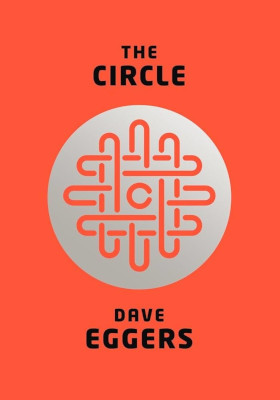
The Circle
By Dave Eggers
The Circle follows the career of Mae Holland, who joins the eponymous company after a few strings are pulled by a college friend Annie. Annie has risen through the ranks and is now highly placed. The Circle is a large and powerful Big-Tech company, getting even bigger and pushing its technology and vision ever further through society, on a global scale. This book was published over ten years ago but is still relevant today, especially as the use of "AI" grows.
There is no longer any anonymity on the internet because Circle's "TruYou" system has taken over identity management and it is required for almost everything now. People know who does what, so bad online behaviour has vanished. And more, their consumer and business marketing and advertising program is just about essential to do any commerce on the internet. Combined with the reach of a massive social media platform ("zings", "smiles" and "frowns" fly about in the ether), the company's reach is planet wide. This means the Circle has huge amounts of data available to its people and algorithms. Even more: small cameras that can be placed anywhere easily, broadcasting 24/7. You can easily look up the quality of the waves at the beach you like to surf from. There is also a project to record and broadcast all your life interactions through a camera around your neck: being "transparent". In the name of democracy, politicians are encouraged to take the brave step of going transparent and the numbers taking part are rising.
As you see, this is Big Tech on steroids.
A cursory read and understanding of the above will make you think of a lot of downsides to this new world order. Eggers mostly leaves the dystopian and darker aspects in the background but does show the terrible consequences for some. It is approaching a panopticon, total surveillance of the sort envisaged for a prison by Jeremy Bentham in the 18th Century. There is little or no discussion of the firm's finances or investors, but we do know there was an IPO, so there will be shareholders. There is a lot of power being wielded, by who? It is left unsaid. Similarly, the acquiescence of sovereign government, domestic and foreign, is not mentioned, other than brief mentions of something like "trouble" in Washington or the EU.
But the juggernaut rolls on; the direction of travel is clear in the world of The Circle. Something very noticeable (apart from some of the speech patterns, see below) was Eggers' portrayal of how enthusiastic and willing the thousands of employees of the company are as they march the world towards a technocratic and dictatorial Final State of complete surveillance. Holland accepts and eagerly rationalises what to most would be an appalling and nightmarish situation: both the result of the technological revolution and the, almost comical, workplace gyrations. Independence of thought is not encouraged, and seems to be easily internalised by the worker bees. I found this difficult to believe. But groupthink does exist and social pressure to "be kind" (cf cancel culture recently) is something to be worried about.
Luckily, so far, there is no one person, company or government fully in charge. But if desires of both an industry and a government do converge, the danger signs should start flashing very brightly.
It's a readable book and a warning about what sort of world we're hurtling towards. I found it hard to believe so many clever people would go along with such an all-encompassing world plan though and some characters were built up to be a stereotype. The potential of "AI" to reduce even further our scope for privacy and human creativity makes the warning more critical today.
Regarding the writing style. I have a quibble about it because it badly jars sometimes. Rather than say "yes" or "no" to answer questions, the people here say things like "I am", or "It is" e.g. "Does that make sense?", "It does" (page 146). They do this all the time, to straightforward questions we would answer naturally with a yes or no. To me, this is highly affected and unnatural speech. I noticed this, but on a much smaller scale, when reading The Expanse series but it is much worse here.



